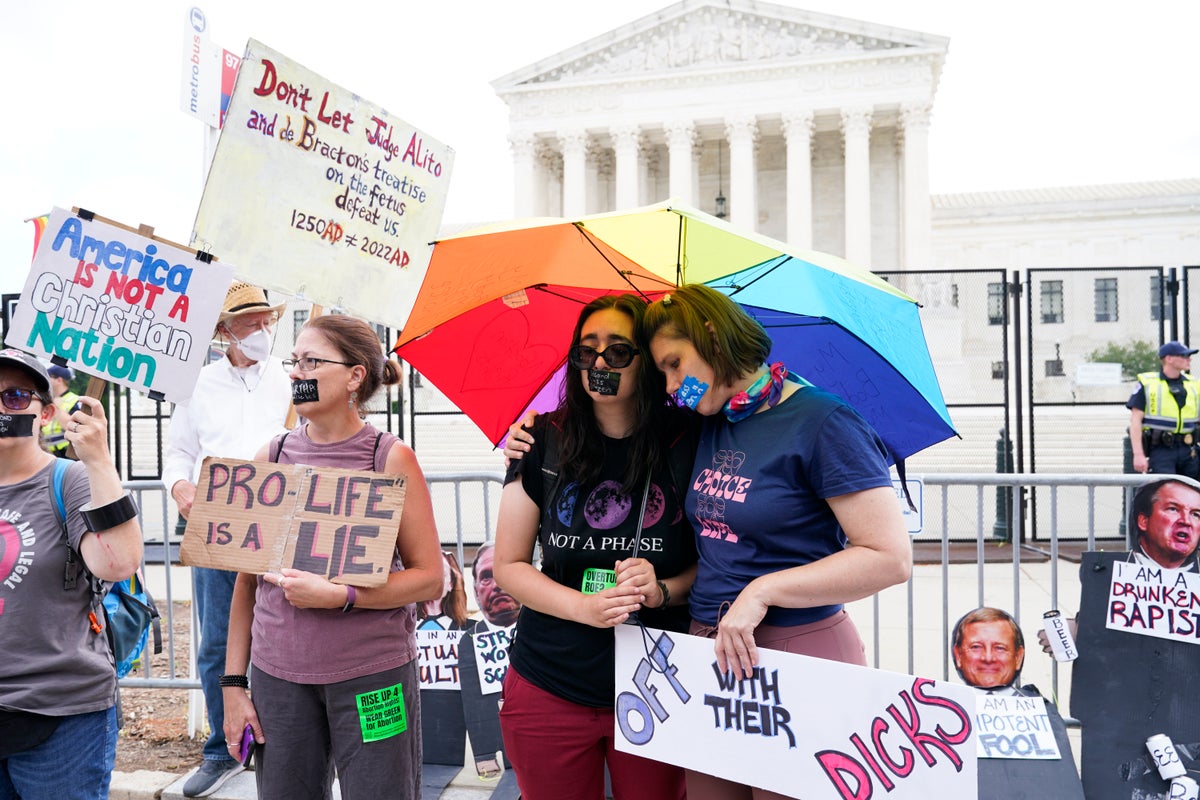
The US Supreme Court’s decision to overturn abortion law is a grave attack on women’s human rights as well as their lives and families, UK abortion providers have said.
The warning comes after the reversal of Roe v Wade - the landmark decision that legalised abortion nationwide in 1973 - meaning millions of women in America will lose their legal right to terminate a pregnancy.
Over half of US states are expected to ban abortion or heavily restrict policies in the wake of the decision. Some states are set to ban abortions even when a pregnancy is as a result of rape or incest or when the woman’s life is at risk due to pregnancy complications.
Clare Murphy, chief executive of the British Pregnancy Advisory Service, the UK’s largest abortion provider, said: “We are appalled by the Supreme Court’s decision to revoke women’s constitutional right to abortion. This is an assault on women’s human rights, their lives, and their families.”
Ms Murphy noted barring abortions does not rid of women’s need to terminate pregnancies but instead just makes getting the procedure harder and far more risky for their health.
She added: “We are calling on the UK government to publicly condemn this assault on women’s human rights, and make clear on the international stage that removing women’s access to swift, safe abortion services has absolutely no place in any society that calls itself civilised in the 21st Century.
“For our politicians to watch silently as women’s rights are rolled-back would be unforgiveable. We urge the government to show leadership as a matter of urgency.”
British prime minister Boris Johnson has said oveturning Roe vs Wade signifies “a big step backwards” as he noted he has “always believed in a woman’s right to choose”.
Speaking at a press conference in Rwanda just after the ruling, the PM said the move will have “massive impacts on people’s thinking around the world”.
Sarah Shaw, of MSI Reproductive Choices, a global abortion provider which runs services in the UK, said it too would “utterly condemn” the decision to overturn Roe v Wade, warning the move could have damaging ripple effects around the world by “emboldening” anti-abortion activists.
The ruling paves the way for unprecedented state legislation to criminalise abortion, as well as other bills that will aim to strip human rights from people in the United States - including the potential for bills that will affect access to birth control, gender and marriage equality, as well as other anti-discrimination laws.— Tarah Demant
She added: “The dismantling of Roe v Wade will provide an opening for the reversal of abortion rights at state level, causing unspeakable harm and threatening decades of progress on gender equality.
“This decision goes against US public opinion and violates the dignity, autonomy and human rights of millions of women across America. Furthermore, it puts healthcare workers at risk of imprisonment for providing essential healthcare.”
Ms Shaw noted many women in the US will not have the “resources to pay for travel, childcare and time off work” so “could be forced to continue their pregnancies against their will or be left with no option but to break the law”.
She added: “What’s more, every pregnancy that ends in miscarriage has the potential to be treated with suspicion. Restrictive laws don’t reduce abortion, they only make them less safe, and it is the poorest and most marginalised communities that bear the brunt.”
The World Health Organisation estimates that each year between 5 and 12 per cent of maternal deaths globally can be attributed to unsafe abortion, with the annual cost of treating major complications from unsafe abortion estimated at $553m (£435m).
Tarah Demant, of the US branch of Amnesty International, a leading human rights organisation, said overturning Roe v Wade “marks a grim milestone in the history” of America, where one in four women seek an abortion during their lives, she said.
Ms Demant added: “The ruling paves the way for unprecedented state legislation to criminalise abortion, as well as other bills that will aim to strip human rights from people in the United States - including the potential for bills that will affect access to birth control, gender and marriage equality, as well as other anti-discrimination laws.”







